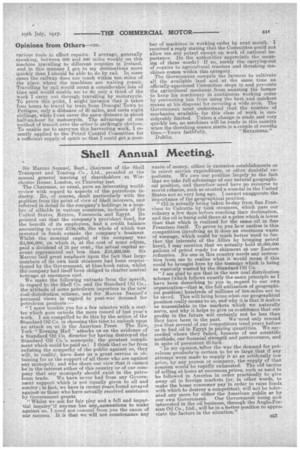Shell Annual Meeting.
Page 17

If you've noticed an error in this article please click here to report it so we can fix it.
Sir Marcus Samuel, Bart., -chairman of the Shell Transport and Trading Co., Ltd., presided at the annual general meeting of shareholders at Winchester house, London, on Thursday last.
The Chairman, as usual, gave an interesting worldreview with regard to aspects of the petroleum industry. He, of course, dealt particularly with the. position from the point of view of Shell interests, and referred in detail to the company's holdings in a number of oilfields in various countries, inclusive of the United States, Mexico, Venezuela and Egypt. He pointed out that the company's provident fund, for the benefit of its employees, had a credit balance amounting to over 1780,000, the whole of which was invested in funds outside the company's business. Whilst the nominal capital of the company was £4,000,000, on which it, at the cost of some odium, paid a dividend of 35 per cent., the actual capital ac count represented not less than £10,000,000. Sir Marcus laid great emphasis upon the fact that large numbers of its own tank steamers had been requisitioned by the Government, at blue-book rates, whilst the company had itself been obliged to charter neutral tonnage at enormous cost. We make the following extracts from the speech, in regard to the Shell Co. and the Standard Oil Co., the attitude of some petroleum importers to the new coal-distribution scheme, and Sir Marcus Samuel's" personal views in regard to post-war demand for petroleum products :— " I must trouble you for a few minutes with a matter which goes outside the mere record of last year's work. I am compelled to do this by the action of the Standard Oil Co. in choosing this time to embark upon an attack on us in the American Press. The New, York "Evening Mail" attacks uis on the evidence of a Standard Oil Co. director for having destroyed the Standard Oil Co.'s monopoly, the greatest compliment which could be paid us I I think that so far from enlisting the sympathy of the public against us, they will, in reality, have done us a great service in obtaining for us the support of all those who are against any monopoly, arid who share our view that it cannot be in the interest either of this country or of our company that any monopoly should exist in the petroleum trade. We have never had from any Government support which is not equally given to all and sundry ; in fact, we have in recent years found arrayed against us those who have actually received assistance by Government grants.
Whilst we ask for fair play and a full and impartial inquiry if anyone has anyvaecnsations to make against us, I need not conceal from you the cause of our success. It is that we will not countenance any
waste of money, either in excessive establishments or in secret service expenditure, or other doubtful exs pedients. We owe our position largely to the fact that we take full advantage of our natural geographical position, and therefore need have no recourse to secret rebates, such as created a scandal in the United States not so very long ago. I cannot exaggerate the
importance of the geographical position. Oil is actually being taken to-day from San Francisco to Calcutta by tank steamers, which pass our refinery a few days before reaching their destination, and the oil is being sold there at.a price which is lower • than that which is realized for the same oil in San Francisco itself. To prove to you how useless is this competition (involving as it does an enormous waste of tonnage, which could be much better 'used to further the interests of the Allies by bringing petrol here), I may mention that we actually hold 30,000,000 gallons of petrol ready for shipment at our Eastern refineries. No one in this country needs any instruction frorn me to realize what it would mean if this could be brought here by the tonnage which is being so wantonly wasted by the Standard Oil Co.
"I am glad to see that in the new coal distribution scheme (which follows exactly the same principle as I have been describing to you in, regard to our own organization—that is, the full utilization of geographical position) hundreds of millions of ton-miles are to be saved. This will bring home-what our geographical position really means to us, and why it is that it makes us unassailable in the markets which we naturally • serve, and why it helps to give us confidence that Our profits in the future will certainly not be less than they have been in the past. We need only remind you that several of our competitors tried years before us to find oil in Egypt in paying quantities. We succeeded where they failed, because of our scientific methods, our financial strength and perseverance, and in spite of persistent ill-luck. " In my opinion, after the war the demand for petrole urn products 'is certain to be so large that if any attempt were made to supply it at an artificially low price, by any person or company, the supply of that concern would be rapidly exhausted. The old tactics of selling at home at enormous prices, such as used to be followed in America in order practically to give away oil in foreign markets (or, in other words, to make the home consumer pay in order to raise funds with -which to destroy a competitor), will not be tolerated any more by either the American public or by our own Government. Our Government' being now interested in the oil business, through the Anglo-Persian Oil Co., Ltd., will be in a better position to appreciate the factors in the situation."




















